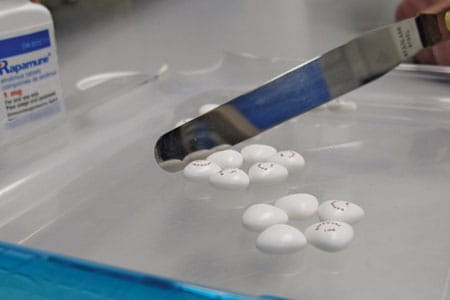Medications – when used properly – can treat our ills and help us to live productive lives. However, when leftover or expired medications are flushed down a sink or toilet, or tossed into the garbage, they can affect our water, our land and the health of all the plants and creatures that depend upon those resources.

"There are environmental concerns with medications ending up in our water table," says Lucas Thorne-Humphrey, clinical pharmacist at Capital Health in Halifax and part-time community pharmacist. "Our sewage treatment plants are not equipped to deal with medications. While some medications break down quickly in nature and in your body, others don't. A lot of medications do not degrade over time; they exist in the environment for a long time, which raises concerns."
In addition to having negative environmental effects, there's another good reason to take care in the disposal of drugs: tossing unused drugs into the garbage could make them accidentally accessible to children, or to other people in your household who should not be taking them, as well as to pets.
His greatest concern is over the proper disposal of unused narcotics. "You really want to make sure they are not consumed by someone who shouldn't be taking them," he says.
Prescriptions that are not used up within the period for which they are dispensed should not be saved for later use. "All medications lose their effectiveness over time; however, a medication like tetracycline [an antibiotic used to treat bacterial infections] can actually become dangerous past its expiry date," says Thorne-Humphrey.
Impact on waterways
At a 2007 workshop conducted by Environment Canada on pharmaceuticals and personal care products in the environment, it was reported that at least 80 pharmaceutical and personal care products (PPCPs) such as analgesics, antibiotics, antiepileptics, antidepressants and blood lipid regulators have been identified in outflows from water treatment plants and in surface waters worldwide. The report also suggested that the presence of pharmaceuticals in Canadian waters is increasing because people use more medications today than they have in the past, and discard more, either through urine or feces or through improper disposal of drugs.The report says pharmaceutical drugs are present in wastewater and in Canadian rivers in parts-per-billion or parts-per-trillion, but because these drugs are biologically active, even tiny amounts can harm fish. Some drugs, such as synthetic estrogens, which are used in birth control pills, are "endocrine disruptors" - compounds that affect reproduction and development. "An excess of estrogens inhibits male fish sexual characteristics and can dramatically decrease fertilization success in exposed fish," the report says.
Long-term exposure of water dwellers to even tiny amounts of some of these drugs is a concern. Research by Dr. Joanne Parrott of the Canada Centre for Inland Waters in Burlington, Ont, showed that when fathead minnows are grown from egg to adulthood in the presence of as little as three parts-per-trillion of synthetic estrogen, they are completely feminized. The male fish express only female characteristics, and are unable to fertilize eggs. That amount of synthetic estrogen is the equivalent of dropping a single birth control pill into 10,000 litres of water. Dr. Parrott, who is the Water Science and Technology Directorate's lead for pharmaceuticals in the environment, says her future research will focus on the effects that a cocktail of pharmaceuticals in wastewater can have on fish.
Proper disposal
The proper way to dispose of medications in Nova Scotia, says Thorne-Humphrey, is to bring them to a pharmacy; such drugs will be incinerated (see "Pharmaceutical Disposal by Province," page 16, for guidelines in other Atlantic Canadian provinces).He adds that it's a good idea to go through all of your medications, both prescription and non-prescription (and any pet medications) at least once a year to collect unused or expired drugs for disposal. Thorne-Humphrey says the bottom line is this: "Don't leave unused or expired medications around the house - and if you have any questions about the safety of a medication, ask a pharmacist."
Pharmaceutical disposal by province
The Post Consumer Pharmaceutical Stewardship Association's website (medicationsreturn.ca) provides information on programs across Canada. Throughout Atlantic Canada, pharmacies are obligated to take back any medications brought to them for disposal. Municipal waste companies may also take unused medications as part of their hazardous waste collection. Here's the breakdown by province:- Nova Scotia has a province-wide Medication Disposal Program, which allows patients to return medications they no longer need to their local community pharmacies for safe disposal. There is no cost to the public.
- New Brunswick does not have a formal province-wide program for the disposal of household pharmaceutical waste, but most regional Solid Waste Commissions offer programs that allow the public to dispose of pharmaceuticals in a safe manner; pharmacies in the province also offer free voluntary pharmaceutical take-back programs.
- PEI has a free take-back program that allows Islanders to take unwanted prescription and over-the-counter medications to local pharmacies for environmentally safe disposal. Pharmaceuticals may also be taken directly to any Island Waste Management Corporation drop-off centre for safe disposal.
- In Newfoundland and Labrador, some municipalities offer semi-annual Household Hazardous Waste (HHW) collection days for residents to dispose of hazardous waste materials, including unwanted pharmaceuticals, free of charge. Pharmacies will also take your unused medications.
